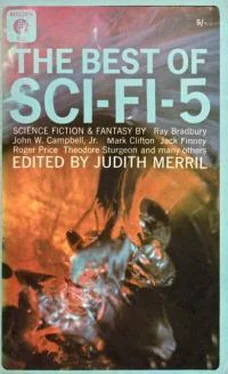The Best of Sci-Fi-5
Здесь есть возможность читать онлайн «The Best of Sci-Fi-5» весь текст электронной книги совершенно бесплатно (целиком полную версию без сокращений). В некоторых случаях можно слушать аудио, скачать через торрент в формате fb2 и присутствует краткое содержание. Год выпуска: 1966, Издательство: Mayflower-Dell, Жанр: Фантастика и фэнтези, на английском языке. Описание произведения, (предисловие) а так же отзывы посетителей доступны на портале библиотеки ЛибКат.
- Название:The Best of Sci-Fi-5
- Автор:
- Издательство:Mayflower-Dell
- Жанр:
- Год:1966
- ISBN:нет данных
- Рейтинг книги:3 / 5. Голосов: 1
-
Избранное:Добавить в избранное
- Отзывы:
-
Ваша оценка:
- 60
- 1
- 2
- 3
- 4
- 5
The Best of Sci-Fi-5: краткое содержание, описание и аннотация
Предлагаем к чтению аннотацию, описание, краткое содержание или предисловие (зависит от того, что написал сам автор книги «The Best of Sci-Fi-5»). Если вы не нашли необходимую информацию о книге — напишите в комментариях, мы постараемся отыскать её.
The Best of Sci-Fi-5 — читать онлайн бесплатно полную книгу (весь текст) целиком
Ниже представлен текст книги, разбитый по страницам. Система сохранения места последней прочитанной страницы, позволяет с удобством читать онлайн бесплатно книгу «The Best of Sci-Fi-5», без необходимости каждый раз заново искать на чём Вы остановились. Поставьте закладку, и сможете в любой момент перейти на страницу, на которой закончили чтение.
Интервал:
Закладка:
The Best of Sci-Fi 5
Edited By Judith Merril
Introduction
In the beginning there was Wonder. Early Man lived !n a world of alternating light and dark, where wind faded to calm and sun succeeded storm, all without cause—where summer heat and winter’s ice were equally marvelous—where the fruit of the soil or the prize of the hunt might, unpredictably, either fill or kill a man.
Ancient Man learned about cause and effect. He sowed, and reaped; trapped the lightning for winter warmth; caught rain in pools against summer’s drought. He flew an arrow with the feathers of a bird; smelted ore for a sharper stone to tip the arrow; modeled a wheel from a rolling stone. The natural miracles he could control ceased to astonish him; those outside his grasp were, perhaps, supernatural? He wondered—about giants, gods, and demons.
Historic Man, guided by the recorded increment of wonders noted (resolved or unsolved), harnessed the energies of wind and water, grouped with his kin to raise up walls of stone, to stop the enemy before the battle; lived longer and more leisurely; learned to think in abstractions; devised mental tools—logic, morality, philosophy; made new tools with which to peer through at the macro-and micro-cosmic realms of the gods and devils. He saw the magnificent orderliness of the universe; banished wonder and base superstition together; rejoiced, and proclaimed the Age of Reason.
Rational Man inhabited a law-abiding world controlled absolutely by Cold Facts and Logic, Physical Laws and Mechanical Principles. He himself was the inevitable sum of Mendelian Laws, Chemistry, Conditioning, and Reflexes. A minimum of marveling was contained in a Rational Deity—a Great Architect who had (with compass, protractor, and Euclid’s Axioms) laid out the universe. The new verities were classified, catalogued, and cross-indexed for eternity. The new technique of observing, testing, and labelling was called the scientific method.
Modern Man used the new tool of experimentation, and learned: to unleash the lightning; make water from air, cloth from coal, food from metals; to create whirlwinds and earthquakes, brew storms and dispel them; defy distance and gravity; outstrip his own noise; cause a sunburst on Earth; and (now, newly) to animate matter.
Wonder—informed, thoughtful, purposeful wonder—is loose on the Earth again. And this is what “SF” means, what “science fiction” is: not gimmicks and gadgets, monsters and supermen, but trained wonderment—educated and disciplined imagination—a marvelous mirror for Modem Man and the world he is only beginning to make,
J.M., Milford, May, 1960
THE HANDLER
by Damon Knight
from Rogue
In one of the two very small towns where both he and I live —Milford, Pa., a river valley resort on the edge of the Poconos—Damon Knight is known as, “You know, the one who always walks down Broad Street reading!”
Milford, with more than a thousand year-round regular residents can, and does, offer a sort of pleased, affectionate, perhaps slightly proud, understanding to its reckless-reader street-crosser. The other (and much smaller) town we both live in—the curiously close-knit community of “science-fictionists”—is less indulgent by far: not that anyone minds how much reading he does; it’s what he says afterward that hurts.
When Anthony Boucher retired as reviewer for Fantasy and Science Fiction, the only logical successor to the post was Damon Knight, then already firmly established as “the other critic” in science fantasy. (I do mean “critic.” Damon has been known to like a book—but rarely to say so. All in all, he has probably poured more vinegar on troubled authors than any other monthly columnist ever thought to keep in stock.)
It is a double pleasure then, to an author-editor like myself, to see him turn his acerbity, auctorially, on a field once-removed from publishing—the world of entertainment.
When the big man came in, there was a movement in the room like a lot of bird dogs pointing. Piano player quits pounding, the two singing drunks shut up, all the beautiful people with cocktails in their hands stop talking and laughing.
“Pete!” the nearest women shrilled, and he walked straight into the room, arms around two girls, hugging them tight. “How’s my sweetheart? Susy, you look good enough to eat, but I had it for lunch. George, you pirate”-he let go both girls, grabbed a bald blushing little man and thumped him on the arm- “you were great, sweetheart, I mean it, really great. Now HEAR THIS!” he shouted, over all the voices that were clamoring Pete this, Pete that.
Somebody put a martini in his hand and he stood holding it, bronzed and tall in his dinner jacket, teeth gleaming white as his shirt cuffs. “We had a show!” he told them.
A shriek of agreement went up, a babble of did we have a show my God Pete listen a show-
He held up his hand. “It was a good show!”
Another shriek and babble.
“The sponsor kinda liked it-he just signed for another one in the fall!”
A shriek, a roar, people clapping, jumping up and down. The big man tried to say something else, but gave up, grinning, while men and woman crowded up to him. They were all trying to shake his hand, talk in his ear, put their arms around him.
“I love ya all!” he shouted. “Now what do you say, let’s live a little!”
The murmuring started again as people sorted themselves out. There was a clinking from the bar. “Jesus, Pete,” a skinny pop-eyed little guy was saying, crouching in adoration, “when you dropped that fishbowl I thought I’d pee myself, honest to God-“
The big man let out a bark of happy laughter. “Yeah, I can still see the look on your face. And the fish, flopping all over the stage. So what can I do, I get down there on my knees-” The big man did so, bending over and staring at imaginary fish on the floor. “And I say, ‘Well, fellows, back to the drawing board!’ “
Screams of laughter as the big man stood up. The party was arranging itself around him in arcs of concentric circles, with people in the back standing on sofas and the piano bench so they could see. Somebody yelled, “Sing the goldfish song, Pete!”
Shouts of approval, please-do-Pete, the goldfish song.
“Okay, okay.” Grinning, the big man sat on the arm of a chair and raised his glass. “And a vun, and a doo - vere’s de moosic?” A scuffle at the piano bench. Somebody banged out a few chords. The big man made a comic face and sang, “Ohhh … how I wish … I was a little fish … and when I want some quail … I’d flap my little tail.”
Laughter, the girls laughing louder than anybody and their red mouths farther open. One flushed blonde had her hand on the big man’s knee, and another was sitting close behind him.
“But seriously-” the big man shouted. More laughter.
“No, seriously,” he said, in a vibrant voice as the room quieted, “I want to tell you in all seriousness I couldn’t have done it alone. And incidentally I see we have some foreigners, litvaks and other members of the press here tonight, so I want to introduce all the important people. First of all, George here, the three-fingered band leader-and there isn’t a guy in the world could have done what he did this afternoon-George, I love ya.” He hugged the blushing little bald man.
“Next my real sweetheart, Ruthie, where are ya. Honey, you were the greatest, really perfect-I mean it, baby-” He kissed a dark girl in a red dress who cried a little and hid her face on his broad shoulder. “And Frank-” He reached down and grabbed the skinny pop-eyed guy by the sleeve. “What can I tell you? A sweetheart?” The skinny guy was blinking, all choked up; the big man thumped him on the back. “Sol and Ernie and Mack, my writers, Shakespeare should have been so lucky-” One by one, they came up to shake the big man’s hand as he called their names; the women kissed him and cried. “My stand-in,” the big man was calling out, and “my caddy,” and “now,” he said, as the room quieted a little, people flushed and sore-throated with enthusiasm, “I want you to meet my handler.”
Читать дальшеИнтервал:
Закладка:
Похожие книги на «The Best of Sci-Fi-5»
Представляем Вашему вниманию похожие книги на «The Best of Sci-Fi-5» списком для выбора. Мы отобрали схожую по названию и смыслу литературу в надежде предоставить читателям больше вариантов отыскать новые, интересные, ещё непрочитанные произведения.
Обсуждение, отзывы о книге «The Best of Sci-Fi-5» и просто собственные мнения читателей. Оставьте ваши комментарии, напишите, что Вы думаете о произведении, его смысле или главных героях. Укажите что конкретно понравилось, а что нет, и почему Вы так считаете.












